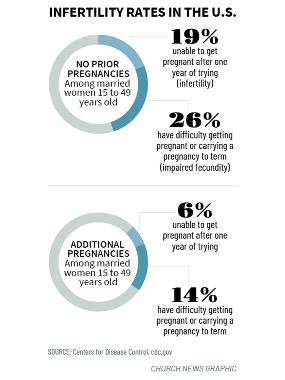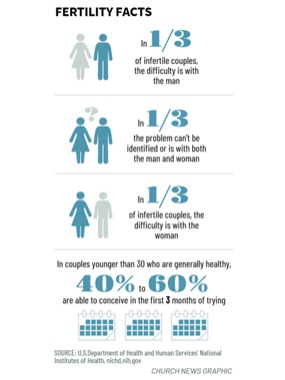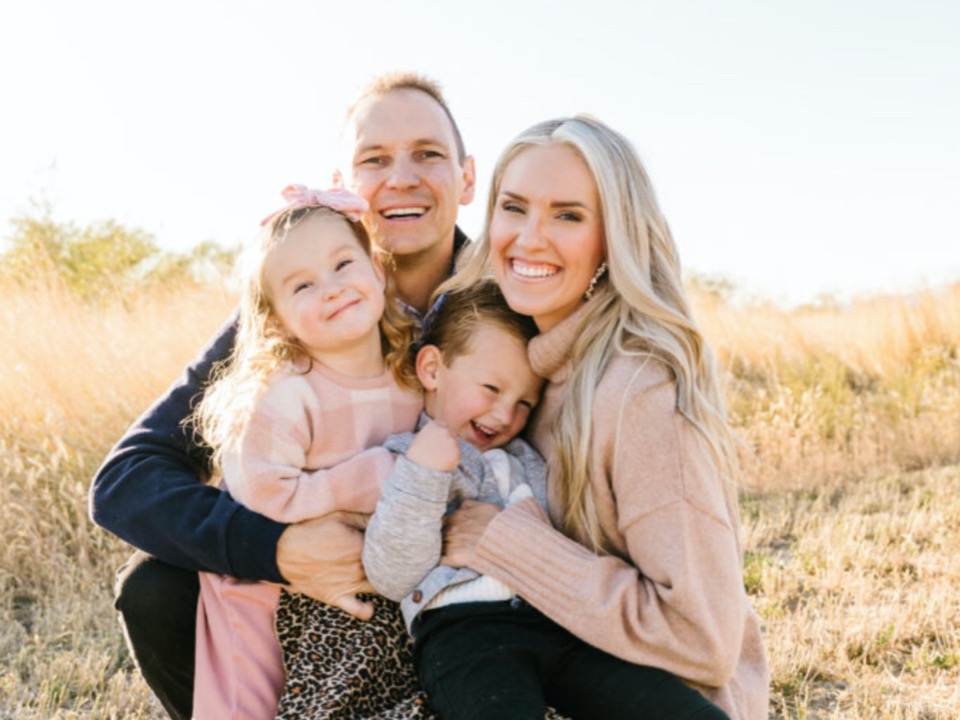
44b525268be18a3293218ff040bf7e8a404d2f74.jpeg
“For this Child Have I Prayed” by Elspeth Young.© 2022 by Intellectual Reserve, Inc. All rights reserved.
This story appears here courtesy of TheChurchNews.com. It is not for use by other media.
By Mary Richards, Church News
Hannah longed and prayed for children to no avail: “And she was in bitterness of soul, and prayed unto the Lord, and wept sore,” reads 1 Samuel 1:10.
About Rebekah in Genesis 25:21: “Isaac entreated the Lord for his wife, because she was barren.”
Rachel said unto Jacob, “Give me children, or else I die” (Genesis 30:1).
When women are mentioned in the scriptures, often it is because of infertility, explained Brianna Magnusson, an associate professor of public health at Brigham Young University. “It is something men and women have experienced throughout history.”
Jenica Parcell and her husband, in the Timpanogos Utah Stake, tried to have a baby for a year when they were in their 20s. Then they turned to fertility treatments and had three failed attempts at intrauterine insemination, or IUI, and two failed rounds of in vitro fertilization, or IVF — including a miscarriage in 2014.
She said she thought, “Wow, this trial isn’t passing. I just figured I’d share when it was over and be like, ‘That was my trial but we got through it and here we are.’”
Parcell was blogging at the time, but not writing anything about the struggles she was going through. “I felt like I was living this double life,” she said.
Seeking Reasons
Like Parcell, Magnusson also dealt with infertility. Because her husband survived pediatric cancer, they knew they would need help conceiving. But then it turned out she also needed help on her end.
She has seen data surrounding infertility in the United States both as a patient and as an academic in the field of public health.

“We used to say 1 in 8, but numbers indicate if you start drilling down to heterosexual women and really look at women of reproductive age, it’s 1 in 5” who have difficulty getting pregnant after one year of trying, she said.
Meanwhile, about 1 in 4 (26%) of women have difficulty getting pregnant at all or carrying a pregnancy to term, which is known as impaired fecundity, according to data from the CDC.
Studies cited by the National Institutes of Health suggest that after one year of trying, 12–15% of couples are unable to conceive, and after 2 years, 10% of couples still have not had a live-born baby.
Dr. Erica Johnstone, an associate professor at the University of Utah and a medical doctor practicing at the Utah Center for Reproductive Medicine, treats couples with infertility.
While women are the main patient, the problem doesn’t always lie with the woman’s body, she said. Quite often there is at least a male factor as part of the cause.
“And we don’t always know what the cause is. Sometimes we do testing and there is no answer and that can be really hard on a couple,” Johnstone said.
Secondary infertility also affects many couples — 6% of married women ages 15–49 who have had a baby in the past are unable to get pregnant again after one year of trying and 14% have difficulty getting pregnant or carrying a pregnancy to term, according to data from the CDC.
“Sometimes people with secondary infertility feel like, ‘Maybe I should be happy with the child I have.’ But from a treatment standpoint, it is still appropriate to be evaluated and treated with secondary infertility,” said Johnstone.
Treatments sometimes take a long time and sometimes they don’t work at all, and that can be hard and exhausting and expensive.
“It’s a situation where you feel out of control because you are on this journey and you don’t know what is going to happen next,” Johnstone said.
Magnusson now has two daughters conceived through IVF. Parcell gave birth to boy-girl twins in July 2016 and is due with another baby this November through IVF.
“It’s just such a hard thing mentally, even more than a lot of other medical diagnoses,” said Parcell. “It’s so common for people to think that there’s something wrong with them or that they did something to deserve this or that God is punishing them — which I don’t believe any of those things — but it’s just so common.”
Feeling Alone
When Parcell first published what she was going through on her blog, she was stunned by the response from all over the world.
“I had no idea how common infertility was at all. But then people were writing me emails saying, ‘Thanks so much for sharing, I’m experiencing infertility too, it’s so nice to know I’m not alone.’ And it was just so eye-opening for me,” said Parcell.
Magnusson said couples can feel really isolated in their pain and heartache over infertility.
“It’s something that our culture, although it is getting better, doesn’t talk enough about. A lot of people, because they are fearful that people will say hurtful things to them, keep this struggle private. That results in a lot of people feeling alone,” she said.

And when someone does share their situation, Magnusson said other people might suggest different treatments or give advice because something worked for someone else. They try to relate but also want to solve the problem.
“Those things are well-intentioned, but they are very painful for people who are struggling with infertility,” she said. “It’s a very individual decision. One thing Church membership broadly could understand better about infertility is each person’s journey is personal.”
Parcell said once she shared her personal journey, she physically felt her shoulders lighten.
“It was like so many people were carrying our burden with us,” she said. “I’ve always prayed for other people, but I don’t think I’d ever really been this visibly on the receiving end of so many people’s prayers, especially people that didn’t even know us.”
Parcell would also like to see more men feel safe to share anything they would like about their experience with infertility. She believes there can be a lot of added pain when one tries to suppress their feelings or believes they are not allowed to feel different emotions.
“I feel like one of the biggest tools of the adversary is to make people feel alone and that you should do it alone,” she said.
As to that, Johnstone said: “It’s a good thing to know they are not alone and to know in their ward in their community there are other couples going through this as well.”
Giving Grace
Johnstone said wards and communities can be more understanding and less judgmental about a couple that doesn’t have children — they might be desperately trying and have been for some time.
“Understanding for couples who are struggling, it’s hard to go to baby showers, it’s hard to be a part of those celebrations. And just offering kindness and grace to couples going through this,” she said.
Johnstone said support groups, couples counseling and talk therapy can be valuable tools. A husband and a wife might feel differently about the situation at different times — one might be hopeful while the other is not, for example.
“I think people should feel it’s okay to talk about it. They should know it’s not their fault. It’s not something they have done. I wish they would feel comfortable talking about other health problems, but not feel guilt or shame about it. To be able to talk about it openly and get care,” she said.
Magnusson said a couple experiencing infertility is not being punished and is not less worthy, although unfortunately people may connect trials and challenges to God’s love for them.
“I don’t think that is consistent with my view of God,” she said. “It’s not about your worthiness, it’s a health condition, and not a personal failing.”
Parcell said the adversary is behind those feelings of unworthiness, because Satan wants people to feel that they are unloved or unworthy or that they should not reach out for support or help. She also sees how social media gives the illusion that other people’s lives are full of ease.
As she has studied further, she has felt her testimony strengthen about the plan of salvation.
“It always came back to this thought, that I know who I am, which is a daughter of God and I know that all human beings come to this earth to experience trials,” she said. “I was never like ‘Why me,’ I was like, ‘Well, why not me?’ We have trials and challenges to refine our character to gain attributes that we wouldn’t have otherwise. And so that knowledge was really the thought that got me through.”

Finding Peace
Johnstone wants couples to know that help is available. She said couples might think they need to wait longer or until a certain time has passed before seeking help for infertility, but it is okay to schedule an appointment and get more information, either from their primary care doctor or from a reproductive endocrinology specialist.
Resources listed in a September 2018 Liahona article about this topic include ways to seek financial and emotional support. “Many countries have a national infertility association that can provide information about various types of treatments, local infertility clinics, support groups and financial aid,” explained the article. Scholarships and reduced fees may be available. Peer-led and professionally led support groups exist online and in person.
Magnusson chose to be public about how she and her husband used IVF for infertility. It’s how their family came together, she said, and she doesn’t want shame to be a part of it.
“If someone wants you to know, they’ll tell you. If people want to talk about it, just listen,” Magnusson said.
And the journey is an individual one. Magnusson said she has a colleague who decided not to pursue pregnancy any longer after having many miscarriages, and that decision must be respected as well. Many couples pursue adoption, which can also be a lengthy, costly and emotional process, yet can also result in a beautiful family.
“You can build a good life in whatever circumstances God has given you,” she said.
She mentioned former Young Women General President Ardeth G. Kapp, and former Relief Society General Presidency Second Counselor Sister Sheri Dew, neither of whom ever bore children.
Sister Dew said in October 2001 general conference, “Motherhood is more than bearing children, though it is certainly that. It is the essence of who we are as women. … As daughters of our Heavenly Father, and as daughters of Eve, we are all mothers and we have always been mothers.”
Magnussen also quoted 2 Nephi 2:25: “Men are that they might have joy.”
She said, “God wants us to be joyful in our circumstances, even when that is difficult. He wants us to experience real joy, and that is found in the gospel.”
In October 2019 general conference, Elder D. Todd Christofferson of the Quorum of the Twelve Apostles spoke about this.
“Even when we are found faithfully keeping the commandments, there are trials and tragedies that could interrupt our joy. But as we strive to overcome these challenges with the Savior’s help, it preserves both the joy we feel now and the joy we anticipate.”
And Elder Dieter F. Uchtdorf of the Quorum of the Twelve Apostles said in April 2014 general conference, “Being grateful in times of distress does not mean that we are pleased with our circumstances. It does mean that through the eyes of faith we look beyond our present-day challenges. This is not a gratitude of the lips but of the soul. It is a gratitude that heals the heart and expands the mind.”
Hannah in the Old Testament “wept sore,” saying “I … have poured out my soul before the Lord.” She turned to the Lord in her distress. When she had a baby, she said, “For this child I prayed” (1 Samuel 1:27). Then she gave over her son Samuel to serve God.
She learned to say in all of her trials, “My heart rejoiceth in the Lord” (1 Samuel 2:1).
Copyright 2022 Deseret News Publishing Company.